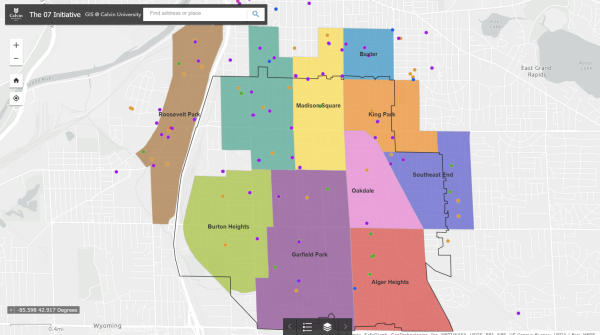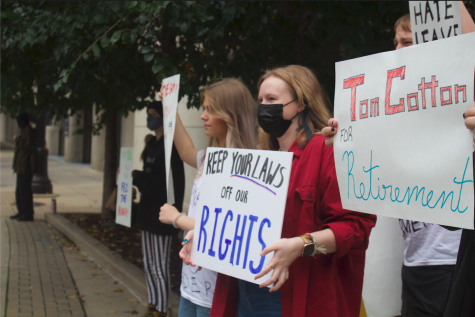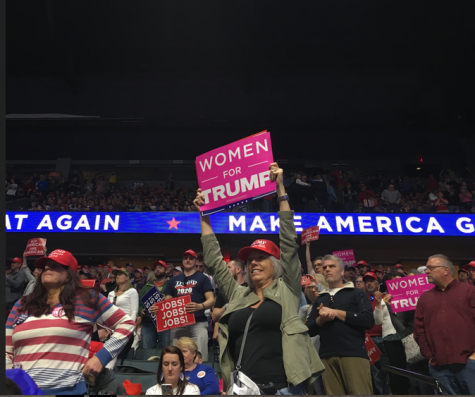Michigan begins Stein-led election recount
Editor’s Note: This article was written on Wednesday, Dec. 7.
Michigan’s sixteen electoral votes weren’t officially Trump’s until last Monday, Nov. 28 — nineteen days after Trump clinched the presidency. The margin was so tight that the state wasn’t called one way or the other for weeks after the ballots were cast. When the official tally came down from the Michigan Board of State Canvassers, Trump had won the state by a mere 10,704 votes.
But that certainty didn’t last long. Now Michigan is undergoing a full recount of the state’s presidential votes.
Green Party candidate Jill Stein has spearheaded the effort and raised the funds required by the state to start the recount process.
Stein has called for recounts in two other states that flipped from blue to red this election: Wisconsin and Pennsylvania. Wisconsin’s recount began Thursday, Dec. 1.
Last time there was a candidate-led recount of a presidential election was in 2000, when the outcome of the election could not be determined without a recount.
This time, Stein doesn’t expect to overturn the results of the election. She is targeting the election’s integrity instead.
“It’s an answer to the widespread distrust and cynicism, frankly, that is pretty pervasive these days,” Stein explained in an interview with the Detroit Free Press. “Confidence is at an all-time low. After this very divisive election, one thing that people feel good about that we can do right now is ensure that our votes were properly counted and that we can have confidence in this very bitter and divisive election.”
For those who hold this view of Stein’s, then, the recount is a matter of principle, of assuring the public that elections were conducted fairly and that each vote counted. For others, the recount is pointed political backlash to Trump’s numerous pre-election premonitions of hacking and voter fraud; Trump often railed against what he called “a rigged system.”
Although Michigan has no concrete evidence of voter fraud, there is one major irregularity in the vote count: there were 84,000 more ballots cast than there were presidential votes counted, according to the state board of canvassers.
This unusually high figure could be accounted for by the extreme unpopularity of both major party candidates this year, which could have resulted in a lot of write-in votes, which aren’t included in that count.
But because the 84,000 ballots with no presidential vote are so much greater in number than Trump’s victory margin of 10,000 in the state, Stein and others believe a recount is necessary.
The recount has thus far consisted of a series of legal challenges, one after the other, as Stein first filed a suit Dec. 1 demanding that Michigan speed up the recount process. Michigan Attorney General Bill Schuette and Trump’s legal team both challenged the recount in court, which delayed the Friday start-date that had been set.
A federal judge ruled Sunday mandating that the recount begin Monday at noon to allow enough time for the count to be completed by the federal deadline, Dec. 13, just a few days before the electoral college convenes.
The Michigan Republican party has continued to fight the recount since that ruling. Ronna Romney McDaniel, Michigan Republican Party chair, released a statement saying she was “outraged that Jill Stein is trying to use the courts to change the outcome of the Michigan election” after “all votes were counted and certified by the Board of Canvassers.”
For McDaniel, “this recount is an incredible waste of Michigan taxpayers’ money” and she promised, “we will vigorously pursue any and all options available to us to overturn this ruling and to end this recount.”
Another challenge was heard by the State Court of Appeals Tuesday. A consolidation of Michigan Attorney General Bill Schuette and Donald Trump’s legal teams filed an appeal that fought the recount on the grounds that Stein is not “aggrieved” by the results because of her low support in the state (Stein received 1% of the vote).
The Appeals court agreed, and ruled Tuesday night that Stein does not meet the definition of one eligible to call a recount and that the state should therefore reject her recount petition.
But the recount is already underway in several counties.
Kent County began recounting ballots on Tuesday, Dec. 6.
Ballots are counted physically, by hand, and counting is conducted in teams of two, who are typically watched by challengers from each party.
A key concern of recount opponents is the cost of the recount. Stein is paying the required $125 per precinct reimbursement for the recount, a bill that amounts to $973,250, but it remains unclear if she will pay for the costs if they exceed the set reimbursement. Secretary of State Ruth Johnson has said costs could reach $2 million.
A bill in the Michigan House has been approved by a committee that will force Stein to pay for all additional costs associated with the recount.
An added issue is that even if the recount is finished before the deadline and workers are able to be paid, some precincts will still not be counted. Over 600 precincts in Wayne County are uncountable because the number of ballots recorded by the poll workers and the number of ballots recorded by the ballot-counting machines did not match. Though the majority of these discrepancies were between one and five ballots different, state law says that votes cannot be recounted if those numbers do not match.
Because Wayne County is heavily Democratic, Clinton’s best chance for gaining votes in Michigan comes from these uncountable precincts, where by law, despite the recount, the original count must stand.
Officials say these irreconcilable numbers are not evidence of tampering necessarily, but human error. In the past, recounts have never been on such a large scale in Michigan, so these issues have not had to be addressed.
State board of elections member Mark Brewer says even though the recount isn’t expected to change anything, these discrepancies are reason enough to continue the recount.
“We have seen already seen voters disenfranchised on election day whose votes we’re just now counting. We’re seeing many precincts unrecountable [sic]. And we’ve seen precincts with large discrepancies,” Brewer said. “These are important revelations. They serve a very important public purpose. For the first time, people are allowed to see inside the election machinery. To stop it at this point would only make suspicion of this election worse.”







